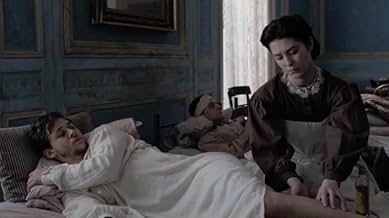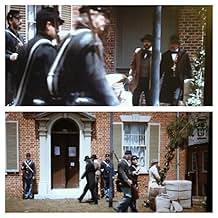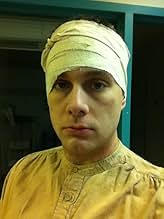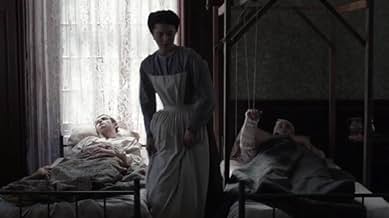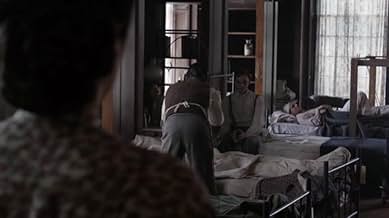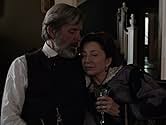IMDb RATING
7.5/10
3.1K
YOUR RATING
Follows the lives of two volunteer nurses on opposing sides of the Civil War - New England abolitionist Mary Phinney and Confederate supporter Emma Green.Follows the lives of two volunteer nurses on opposing sides of the Civil War - New England abolitionist Mary Phinney and Confederate supporter Emma Green.Follows the lives of two volunteer nurses on opposing sides of the Civil War - New England abolitionist Mary Phinney and Confederate supporter Emma Green.
- Awards
- 1 win total
Browse episodes
Featured reviews
This series is unique for presenting the ambivalence and contradictions of the Civil War Era. The protagonist nurse is a staunch abolitionist who is made to accept the need to also help Confederate wounded by a doctor who is loyal to the Union and thus a traitor to his slave- owning pro-Confederate Maryland family. Nevertheless he is unmoved by abolitionist sentiments--until he meets a free black Philadelphia man he admires.
The head of the Southern family that owns the hotel-turned hospital works to save his holdings and business interests while not betraying his Southern loyalties. He opposes efforts by Union soldiers to enforce claims to return runaway slaves (seems unhistorical here set in 1862- -I thought the Union stopped returning "contraband" in 1861.)
The African-American characters debate the merits of freedom versus the security of slavery or of employment not much removed from slavery.
In short, the moral certainties of hindsight are removed and the characters must struggle in their contemporary context. I do enjoy that.
Some casting choices were surprising but they all work.
The head of the Southern family that owns the hotel-turned hospital works to save his holdings and business interests while not betraying his Southern loyalties. He opposes efforts by Union soldiers to enforce claims to return runaway slaves (seems unhistorical here set in 1862- -I thought the Union stopped returning "contraband" in 1861.)
The African-American characters debate the merits of freedom versus the security of slavery or of employment not much removed from slavery.
In short, the moral certainties of hindsight are removed and the characters must struggle in their contemporary context. I do enjoy that.
Some casting choices were surprising but they all work.
This series began with real promise - an American period drama along the lines and quality of what Masterpiece has imported from across the pond. And for the most part, the first season delivered.
But the second season devolved into a Grey's Anatomy-style soap (complete with the annoying underscore) that treated the horrors and suffering of the Civil War as a backdrop for quirky characters and their high jinks. The psychological drama never reached deeper than a wading pool.
The real mercy in Mercy Street was putting it out of its misery at the end of the second season.
But the second season devolved into a Grey's Anatomy-style soap (complete with the annoying underscore) that treated the horrors and suffering of the Civil War as a backdrop for quirky characters and their high jinks. The psychological drama never reached deeper than a wading pool.
The real mercy in Mercy Street was putting it out of its misery at the end of the second season.
"Mercy Street" takes place at the start of the Civil War, in a Union Hospital in Alexandria, Virginia, where a newly appointed "head nurse" must contend with multiple issues in her attempt to organize services. There are all sorts of problem she must confront – how to care for Confederate troops in a Union hospital, how to deal with slaves and freed Blacks, the rivalries between different types of nurses, the hierarchical relationship with Physicians, the influence of European medicine, etc.
The settings are marvelous as are the costumes. The acting is very good, especially from head nurse and ardent abolitionist Mary Elizabeth Winstead and Confederate volunteer Hannah James. TV Stalwarts Gary Cole, Peter Gerety, and Cherry Jones are on hand as well. At times modernism creep into the dialogue, as well as the mannerisms, but generally speaking it has an authentic mid 19th Century feel. There is also some failings in the accents which seem to range all over the place, even among family members.
The first two episodes manage to keep the soap opera elements at a minimum while showing us what it must have been like to be a part of the process. This show is entertaining while it is simultaneously educational. It won't appeal to everyone, but anyone interested in Medicine, or the Civil War, will find it compelling.
The settings are marvelous as are the costumes. The acting is very good, especially from head nurse and ardent abolitionist Mary Elizabeth Winstead and Confederate volunteer Hannah James. TV Stalwarts Gary Cole, Peter Gerety, and Cherry Jones are on hand as well. At times modernism creep into the dialogue, as well as the mannerisms, but generally speaking it has an authentic mid 19th Century feel. There is also some failings in the accents which seem to range all over the place, even among family members.
The first two episodes manage to keep the soap opera elements at a minimum while showing us what it must have been like to be a part of the process. This show is entertaining while it is simultaneously educational. It won't appeal to everyone, but anyone interested in Medicine, or the Civil War, will find it compelling.
I had high hopes for Mercy Street. Fictionalized history has become increasingly popular in recent years, and this show had potential to be one of the more memorable ones, with a previously untapped setting and a cast full of talented actors. Sadly, the show has turned out to be mostly unremarkable.
The basic premise is simple: a widowed woman is sent to become head nurse at a military hospital converted from a hotel in Union-occupied Alexandria, Virginia. On top of this premise, the show's writers have piled enough dramatic crises and neurotic characters to populate a full soap opera. Everyone is constantly shouting at each other and plotting behind each other's backs.
Given the setting, conflict and friction is understandable, and of course a drama needs, well, drama. But with only six episodes, they've created enough plot lines to easily fill a US-standard 22-episode season, if not more. Everything is just so busy that the only way we learn anything about the characters is through their conflicts. Calm moments are few and far between. Most performances border on scenery- chewing, except of course when they jump well past that border.
That said, there are a number of things to enjoy. Mary Elizabeth Winstead, always a treat, seems so comfortable with the trappings of the period you'd think she was born into it. Donna Murphy is exquisite as the quintessential Southern matriarch, turning borderline overacting into a virtue. Tara Summers has channeled all the snarky disdain of Alan Rickman while Jack Falahee is the spitting image in looks and charm of a young Johnny Depp. Gary Cole, one of the few cast members not constantly gnaw at the walls, adds just enough temper to his usual near-deadpan dryness to be a realistic Southern businessman trying to hold onto what little he has left after the Union takes everything.
The real surprise, though, is Josh Radnor. If you've only seen him in How I Met Your Mother, you'd have no idea that he's capable of the quietly powerful performance he turns in here. Yes, he does spend a lot of time chomping on the set, but he balances that with more subtle moments that reveal significant talent he hasn't had much opportunity to utilize. In many ways, he reminds me of Mandy Patinkin in his younger days.
Ultimately, the show is entertaining enough to be worth watching if you like fictionalized history. Just don't expect more from it than it is.
The basic premise is simple: a widowed woman is sent to become head nurse at a military hospital converted from a hotel in Union-occupied Alexandria, Virginia. On top of this premise, the show's writers have piled enough dramatic crises and neurotic characters to populate a full soap opera. Everyone is constantly shouting at each other and plotting behind each other's backs.
Given the setting, conflict and friction is understandable, and of course a drama needs, well, drama. But with only six episodes, they've created enough plot lines to easily fill a US-standard 22-episode season, if not more. Everything is just so busy that the only way we learn anything about the characters is through their conflicts. Calm moments are few and far between. Most performances border on scenery- chewing, except of course when they jump well past that border.
That said, there are a number of things to enjoy. Mary Elizabeth Winstead, always a treat, seems so comfortable with the trappings of the period you'd think she was born into it. Donna Murphy is exquisite as the quintessential Southern matriarch, turning borderline overacting into a virtue. Tara Summers has channeled all the snarky disdain of Alan Rickman while Jack Falahee is the spitting image in looks and charm of a young Johnny Depp. Gary Cole, one of the few cast members not constantly gnaw at the walls, adds just enough temper to his usual near-deadpan dryness to be a realistic Southern businessman trying to hold onto what little he has left after the Union takes everything.
The real surprise, though, is Josh Radnor. If you've only seen him in How I Met Your Mother, you'd have no idea that he's capable of the quietly powerful performance he turns in here. Yes, he does spend a lot of time chomping on the set, but he balances that with more subtle moments that reveal significant talent he hasn't had much opportunity to utilize. In many ways, he reminds me of Mandy Patinkin in his younger days.
Ultimately, the show is entertaining enough to be worth watching if you like fictionalized history. Just don't expect more from it than it is.
10itazuke
I love this series....after reading some of the reviews I realized how 'nit-picky' some people are...they should be grateful that there are programs like this on television.......today we have such garbage for a selection of programs....who cares if the dialog is lame or if nurses talk back to doctors and it wasn't customary of the day, but mind you, there have been feisty and independent women throughout history .....enjoy the non-commercial program and take in a little bit of how harsh our ancestors really did have it......or go watch some lame 'reality' show on TLC. We need more period movies and series on television
Did you know
- TriviaThe real Alice Green actually died a few weeks short of her 15th birthday in early 1860, over a year before the start of the Civil War.
- How many seasons does Mercy Street have?Powered by Alexa
Details
- Release date
- Country of origin
- Official sites
- Language
- Also known as
- Улица милосердия
- Filming locations
- Laburnum House - 1300 Westwood Avenue, Richmond, Virginia, USA(Mansion House Hotel)
- Production companies
- See more company credits at IMDbPro
Contribute to this page
Suggest an edit or add missing content




